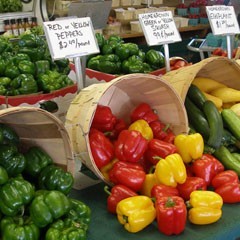Resources

We have compiled a list of useful resources for growers, consultants and agri-business people, organized by category. We hope that these websites can provide you with additional information, photos, and guidance.
GENERAL
Cornell University Vegetable Program
https://blogs.cornell.edu/cornellvegetables
Cornell Cooperative Extension (CCE)
The Cornell Cooperative Extension website provides an overview of CCE programs across New York State.
Cornell Good Agricultural Practices (GAPs)
Information about the National GAPs Program and upcoming GAPs events.
https://cals.cornell.edu/national-good-agricultural-practices-program
BUSINESS
Cornell Small Farms Program
https://smallfarms.cornell.edu/
Small Farms Online Courses
GUIDELINES
Cornell Veg Crop & Pest Management Guidelines
Integrated Crop and Pest Management Guidelines for Commercial Vegetable provides up-to-date vegetable crop production information for New York State. Included are cultural and pest management strategies for the major vegetable crops grown in New York State. It has been designed as a practical guide for vegetable crop producers, crop consultants, ag chemical dealers, and others who advise vegetable crop producers.
Guidelines may be purchased from The Cornell Store. You may purchase a print copy or online access.
https://store.cornell.edu/c-875-pmep-guidelines.aspx
Organic Production Guides
Organic Integrated Pest Management for 8 vegetable groups, tree & small fruit, and grapes, and more
https://hdl.handle.net/1813/41246
GREENHOUSE & TUNNELS
Cornell University High Tunnel
This site provides growers with more information from Cornell's high tunnel team: types of structures, business and marketing resources, and crops that grow particularly well in the tunnel environment.
http://hightunnels.cals.cornell.edu/
SARE Season Extension Topic Room
A section of the Sustainable Agriculture Research & Education (SARE) website, the season extension topic room provides nationwide research in the areas of variety trials, fertility management, pest management, water management, energy, and marketing and economics.
http://www.sare.org/Learning-Center/Topic-Rooms/Season-Extension-Topic-Room
PESTS
Cornell Vegetables -- Disease Factsheets and Articles
If you were a big fan of Vegetable MD Online website (which has been retired), much of that content has been moved here.
https://www.vegetables.cornell.edu/pest-management/disease-factsheets/
Network for Environment & Weather Awareness (NEWA)
Awareness for disease, insect and weather forecasts.
The following links provide information and learning resources for NEWANEWA apple tools - learning resourcesNEWA Blog - updatesNEWA Get Help - FAQs and weather station resources
NYS IPM Program
Developing sustainable ways to manage pests and help people to use methods that minimize environmental, health, and economic risks.
https://cals.cornell.edu/new-york-state-integrated-pest-management
SOIL HEALTH
SARE Cover Crop Topic Room
A section of the Sustainable Agriculture Research & Education (SARE) website, the cover crop topic room provides educational materials developed from cover crop research. Topics include selection and management, economics, establishment, rotations, soil and fertility management, water management, pest management, and no-till.
http://www.sare.org/Learning-Center/Topic-Rooms/Cover-Crop-Topic-Room
Cornell Soil Health
Information to help you return your soil to a healthy state or keep an already good soil productive.
http://soilhealth.cals.cornell.edu
The Cornell Nutrient Analysis Laboratory
Provide accurate and cost effective analysis of soil (Cornell Soil Health Test, Illinois Soil Nutrient Test, other specialized soil tests), plant and water samples.

Upcoming Events
African Eggplant Participatory Breeding Kick-Off
March 5, 2026
Join us to learn about the Cornell African Eggplant Research Project and learn how you can participate! African eggplant, also known as Bitterball, Garden Egg, Kittley and other names, is an important crop for many members of our community with heritage from regions such as sub-Saharan Africa, Southeast Asia, and Brazil. Since 2024, the Cornell African Eggplant Research Project has been collaborating with growers and community partners across New York to develop high-quality varieties adapted to the Northeast U.S. In this meeting, we will share information about growing and preparing African eggplant, highlight our research to date, and invite partners to collaborate with us in our 2026 participatory breeding and variety selection efforts.
COST: FREE! You must pre-register to receive the Zoom link.
Managing the Invasive Swede Midge Webinar
March 6, 2026
Swede midge is an invasive fly that causes serious economic losses to brassica crops. Due to its small size and hidden feeding habits, swede midge is often called an "invisible pest" and damage may be misdiagnosed. In this webinar, we will review the swede midge life cycle and crop damage symptoms, current management recommendations, new research findings, and highlights from on-farm case studies with a focus on organic management.
1.75 DEC pesticide recertification credits in categories 1a, 10, and 23.
Good Agricultural Practices (GAPs) Food Safety Training
March 10, 2026
Newark, NY
Learn about food safety on the farm! This event hosted by the Cornell Vegetable Program, Cornell Lake Ontario Fruit Team, CCE Wayne County, and the NYS Department of Agriculture, will cover good agricultural practices (GAPs) to help reduce the risk of microbial contamination on the farm, keeping food and consumers safe.


































